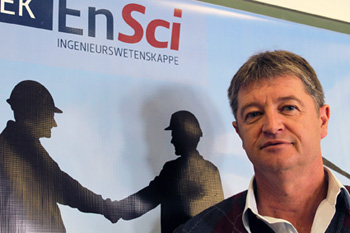Latest News Archive
Please select Category, Year, and then Month to display items
12 January 2024
|
Story Nonsindiswe Qwabe
|
Photo Sonia Small
 Since joining the UFS in 2008, Dr Grey Magaiza has worked extensively on approaches that can foster the socio-economic transformation of societies.
Since joining the UFS in 2008, Dr Grey Magaiza has worked extensively on approaches that can foster the socio-economic transformation of societies.
“The future should be one where communities can decide on their development agenda and futures. That’s the most important for me.” Dr Grey Magaiza, Deputy Director of the Centre for Gender and Africa Studies (CGAS) and Head of the Community Development programme on the Qwaqwa Campus, is passionate about capacitating communities to be agents of change and advancement. His vision for the future emphasises the empowerment of communities to take charge of their development by actively participating in decision making and the implementation of development projects that can improve their lives.
Since joining the UFS in 2008, Dr Magaiza has worked extensively on approaches that can foster the socio-economic transformation of societies. Over the years, he has crafted his research speciality into one that he is most proud of – being an interdisciplinary scientist immersed in the development of communities.
“I’m in a fortunate position of researching what I like. I say ‘fortunate’, because I’ve taken the time to understand what I’m passionate about, which is the overall field of rural livelihoods and livelihood futures – in short, community development. My research starts from an engaged university, understanding the elements that a university must use to enhance transformation and relevance to its immediate community in terms of development.”
One of the ways he has done this is by looking at social entrepreneurship as a development approach for young people in a rural setting. Through workshops with non-profit and civic organisations in Qwaqwa, Dr Magaiza has been helping these organisations to map out their needs and actively meet them through the involvement and support of external role players.
“We understand that communities are part of the national development agenda, but even that national agenda respects community knowledge and intentions and allows communities to shape their identity. A critical enabler of this is community organising. You bring back the capacity in communities to have dialogues on issues affecting them as spaces for engagement, knowledge exchange, and for people to just talk about their way forward.”
By enabling communities to define their development agenda, they can address their specific needs, challenges, and aspirations, he said. “When I look at livelihood futures, it’s quite an exciting aspect of my work – it’s like looking into a fortune tellers’ globe, because you’re not deciding for communities what they should do, but the communities themselves take those decisions.”
UFS provides an alternative route to a BEng degree
2014-06-04
 Mr Louis Lagrange Mr Louis Lagrange
Photo: Leonie Bolleurs |
The university is very excited about the establishment of a new study field at Kovsies – a BSc degree with majors in Physics and Engineering subjects. The course is presented in the Faculty of Natural and Agricultural Sciences on the Bloemfontein Campus.
Project EnSci was established at the UFS at the beginning of 2014. Twelve first-years and four second-years enrolled for the course this year.
“We replace the non-core Physics subjects with Engineering subjects. We also present all specialist Engineering subjects ourselves,” says Louis Lagrange, project manager of Projec EnSci – Engineering Science.
“There isn’t enough space at universities in South Africa to accommodate all students who are interested in engineering. The UFS course can thus be considered a fundamental engineering course. It equips a student in such a way that they will be able to specialise in various disciplines,” he says.
After completion of the three-year BSc degree at the UFS, students may choose to:
• graduate with a BSc degree majoring in Physics and Engineering subjects and enter the professional world.
• study further for an honours, master’s or doctoral degree in Physics.
• apply to register for a second degree – BEng or BScEng (for two additional years) at another university recognising the BSc degree with majors in Physics and Engineering Science. Acceptance is subject to certain requirements.
Matriculants interested in this field, must follow the application procedure of the UFS before 30 September 2014 and achieve the following in the final NSC or equivalent examination:
• an AP score of 34 or more is strongly recommended,
• cumulative AP score of 13 or more in Mathematics and Physical Science,
• completion of NBT tests and
• language of instruction – 4 or more.
These prospective students also need to complete and submit an application form. For more information contact us at engineeringsubjects@ufs.ac.za